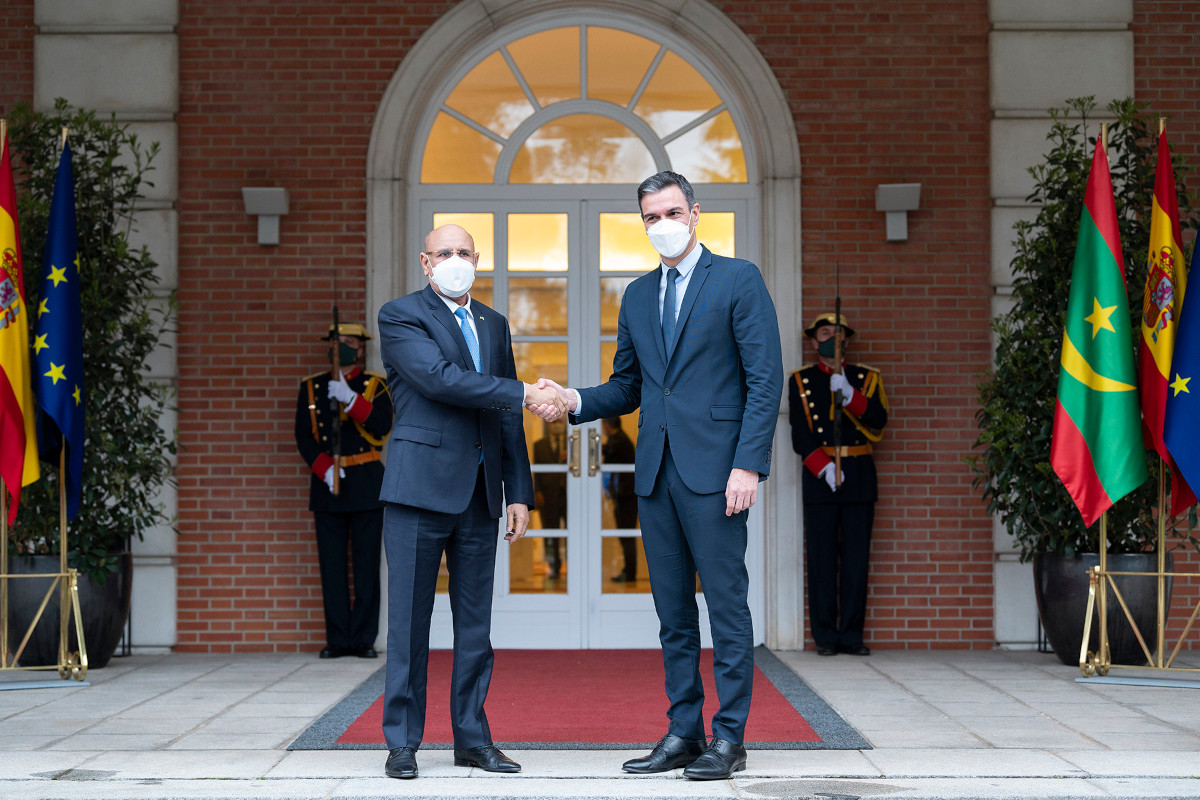Analysis: The politics behind the EU-Mauritania migration partnership
29 April 2024
On 7 March, the EU and Mauritania signed a landmark “migration deal.” This January note from the European Commission makes the case for the deal to EU member state representatives in the Council. Dated 26 January, and therefore preceding both the public announcement of the deal on 7 February and its signing one month later, the note offers insight into the politics behind the migration partnership deal between Mauritania and the EU.
Support our work: become a Friend of Statewatch from as little as £1/€1 per month.

Mauritanian president Mohamed Ould Ghazouani meets Spanish prime minister Pedro Sanchez in Spain, 2022. Image: La Moncloa, CC BY-NC-ND 2.0
Key takeaways
- The deal replaced a proposed Frontex status agreement, which was deemed too “politically sensitive” by Mauritanian authorities
- Mauritanian authorities feel that there had been insufficient recognition by the EU of their cooperation in preventing irregular departures
- Mauritania appears to exercise leverage over the EU due to its status as one of the few remaining western allies in the region
Context
The migration deal envisioned in this note (discussed at the External Aspects of Migration Working Party on 12 February) was the latest in a long line of measures taken by Spain and the EU to curb arrivals on the Canary Islands. Dating to 2006, these involve military and security measures as well as “softer” strategies of development aid and youth employment programmes. These have been implemented through a variety of frameworks, such as the 2010 national migration strategy and the EU Trust Fund for Africa’s Sahel and Lake Chad window. The deal itself, announced at the beginning of March, promises a similar package of measures, involving support to the Mauritanian border and security forces in combatting people smuggling and human trafficking and bolstering Mauritanian border management and surveillance capacities. It also promises funds for job creation in the country, strengthening the asylum system and legal migration schemes.
Mauritania: “very good” cooperation on migration
The note starts out with an overview of Mauritania’s strategic significance to the EU. This significance consists firstly in its capacity as a departure point for the Canary Islands. It notes a steep increase in arrivals on the Canary Islands in 2023 from Mauritania compared with 2022. It also emphasises Mauritania’s status as a “transit country”, due to the negligible number of Mauritanian nationals arriving irregularly on EU territory in 2022 and 2023. (This absence of Mauritanian nationals among arrivals on European territory is interesting given the sharp increase of Mauritanians arriving in the US via the Mexico border over the same period.)
Secondly, this strategic significance to the EU is rooted in the wider geopolitical situation in the region. As the document puts it: “In the Sahel, which is experiencing increasing insecurity and instability, Mauritania, at this stage, is the only democratic country that is cooperating with the EU.” The note refers to cooperation with the country on migration as “very good.” Unlike Mali, Niger, and Burkina Faso, which have ejected French and EU forces from their respective countries and established a regional security alliance to rival the Western-backed G5 Sahel, Mauritania remains a loyal (if ambivalent) EU partner in the Sahel.
Taken together, these two elements of Mauritania’s strategic significance suggest potential leverage over the EU by Mauritanian authorities, or at least an incentive for the EU to take Mauritanian government concerns seriously. Indeed, the note also refers to warnings Mauritania had issued with regard to the security of its eastern border, echoing a September 2023 document from the Spanish Presidency of the Council of the EU.
From status agreement to migration partnership
The note then describes how a proposed status agreement that would have authorised a Frontex deployment on Mauritanian territory was shelved, despite an initial expression of interest and four rounds of negotiations. The reason given is that Mauritania realised “the status agreement was politically too sensitive.” As an alternative, Mauritanian authorities proposed “a legally binding framework of cooperation with the EU on migration, encompassing all areas, along the lines of those that, according to Mauritania, had been concluded with other transit countries.” The agreement that emerged from this proposal - the one that was publicly launched on 7 March - is non-binding, but it appears that this desire was otherwise accommodated.
At first glance, this depiction of the Frontex status agreement as more politically sensitive than the migration partnership deal that was signed in its place appears questionable, given how controversial this deal has proven to be in Mauritania: the day it was signed, police dispersed a protest against it in the capital. The status agreement, on the other hand, could have been passed off quietly, compared with the public-facing press statements and joint declaration associated with the migration deal.
However, the political sensitivity of the status agreement may have had less to do with its reception by the Mauritanian public and more by the security forces, whose operational jurisdiction would have arguably been challenged by a direct Frontex presence. Such jurisdictional disputes are already common within European territory, as evidenced in reported “discrepancies” surrounding competences shared between the Spanish Policía Nacional and Guardia Civil and a Frontex deployment on the Canary Islands.
In the Mauritanian context, the joint declaration that announced the migration partnership still envisions “enhanced cooperation between Mauritania and Frontex,” but with the important stipulation that this be “in accordance with the needs identified by Mauritania in this area, in particular in terms of equipment and training, and with due regard for its sovereignty.” This latter clause might be read as an attempt to address the political sensitivity of any Frontex presence in the country.
The note provides further context to this transition from a Frontex status agreement to a more comprehensive migration partnership, detailing the Mauritanian view that the EU has not sufficiently recognised Mauritania’s efforts to support EU migration concerns in the country. These points were already made in the September 2023 Spanish Council Presidency document, but given that the source is now the European Commission, it suggests that these concerns have been heard. Of the €210 million that was promised in the deal, an EU source indicates that €28 million is destined for development and security projects in the eastern Hodh Ech-Chargui region, where the majority of the 120,000 refugees currently in Mauritania, who are mostly from bordering Mali, reside. This is likely an attempt to address the Mauritanian concerns that migration cooperation has so far reflected EU concerns rather than domestic security ones.
The way forward
The note concludes with an overview of the different exchanges that have taken place at various levels between Mauritania and the EU since September 2023, and with a discussion of the “way forward.” Regarding the latter, the note makes reference to the procedures for a establishing a non-binding instrument, and aims “to launch a regular migration dialogue, to be held once a year at senior official level and yearly or bi-yearly at political level.”
Establishing regular dialogue frameworks with non-EU countries is a key interest of the EU and a building block of its externalisation architecture. Based on the information made available through the document analysed here, it is likely that the unfolding of migration control cooperation will remain both a central diplomatic issue between the EU and Mauritania as well as a contested one within the country.
Hassan Ould Moctar (writer, researcher and consultant)
Our work is only possible with your support.
Become a Friend of Statewatch from as little as £1/€1 per month.
Spotted an error? If you've spotted a problem with this page, just click once to let us know.
